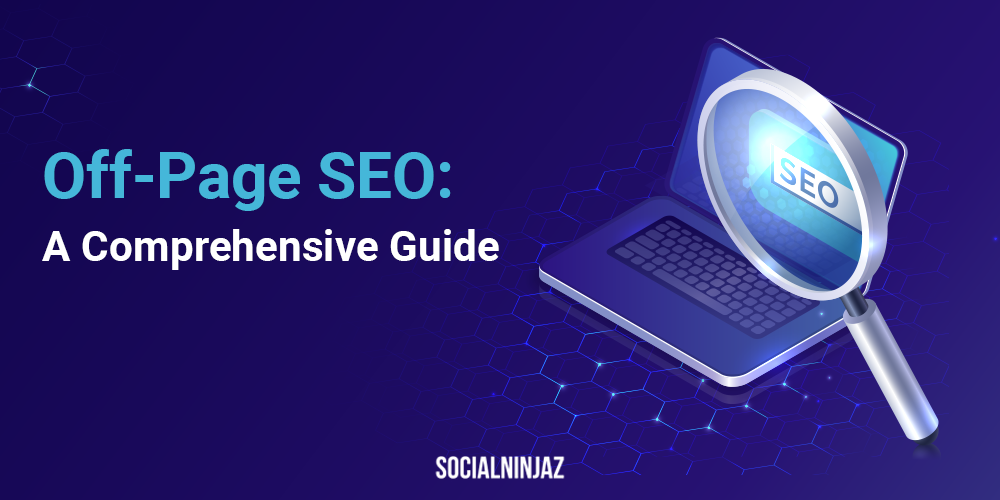Off-page SEO is the process of optimizing your website and its ranking through techniques that do not take place on your website. It includes activities like link building, social media optimization, and influencer marketing. Off-page SEO is crucial in today’s digital landscape as it helps search engines understand the relevance and authority of your website. It also plays an essential role to drive traffic to your website, increasing brand awareness, and boosting your search engine rankings.
What is Search Engine Optimization?
SEO is an essential component of digital marketing and website optimization. It is bifurcated into two major domains: On-Page SEO and Off-Page SEO. On-Page SEO deals with optimizing the content and structure of a website, while Off-Page SEO deals with external factors that impact the ranking of a website in search engine results pages (SERPs).
Off-Page SEO refers to all the activities and strategies one undertakes outside of your website to improve its ranking and visibility in the search results. The main objective of Off-Page SEO is to increase the authority and trust of a website in the eyes of search engines for higher keyword rankings.
Here is a comprehensive guide on Off-Page SEO, covering all the crucial aspects you need to know.
1. Link Building
One of the most crucial parts of off-page SEO is link building. It involves acquiring backlinks to your website from other relevant and authoritative websites. Backlinks are similar to recommendations from other websites in that they alert search engines that your website is a reliable and authoritative source of information. The more high-quality backlinks your website has, the better it is likely to rank in search engines.
It’s dominant to keep in mind that the quality of links is more important than quantity. A single high-quality link from a reputable website can be more valuable than several low-quality links.
2. Guest blogging
Guest blogging is another significant part of off-page SEO. It involves writing and publishing articles on other relevant and high-authority websites in your niche. It can help you acquire backlinks to your website, which can help improve your visibility and ranking in search engines.
When guest blogging, it is crucial to ensure the websites are highly optimized, secured and related to your niche and industry. Your guest blog articles should be high-quality, well-written, and informative.
3. Social Media Optimization
Social media is a powerful tool for Off-Page SEO. Increase your visibility to reach a wider audience by promoting your brand via Social Media. Search engines consider social signals, such as the number of likes, shares, and followers, as a factor in determining the ranking of a website. It means that by optimizing your social media presence, you can improve the ranking of your website in the search results.
To optimize your social media presence, you should:
-Post regularly and consistently
-Use keywords in your posts
-Engage with your audience by responding to comments and messages
-Share your website’s content on social media
-Collaborate with influencers in your niche
4. Influencer Marketing
As part of off-page SEO, influencer marketing is also crucial. It involves collaborating with influential people in your niche to promote your website and attract a larger audience. Influencer marketing can assist you in developing a firm online presence and increasing traffic to your website. The more influential people who promote your website, the better it will rank in search engines.
When trying influencer marketing, ensure the influencers you partner with are relevant and have a strong reputation in your niche. The content produced as part of your influencer marketing campaign should be high-quality.
5. Local SEO
Local SEO is a type of Off-Page SEO that focuses on optimizing a website for local search results. It is essential for businesses serving the local markets, such as restaurants, salons, or retail stores.
To optimize your website for local search results, you should:
-Claim and verify your Google My Business listing
-Include your business name, address, and phone number (NAP) on your website and other online directories
-Encourage customers to leave reviews on your Google My Business listing and other review websites
-Optimize your website for local keywords
-Encourage local citations and mentions of your brand
In conclusion,
By implementing effective strategies such as link building, social media marketing, and influencer outreach, you can boost your website’s visibility and credibility, leading to higher rankings and more organic traffic. Remember, off-page SEO is a long-term investment, so be consistent and patient with your efforts, and you will see the results over time. With the right approach, off-page SEO can be a powerful tool for growing your online presence and driving business success.
